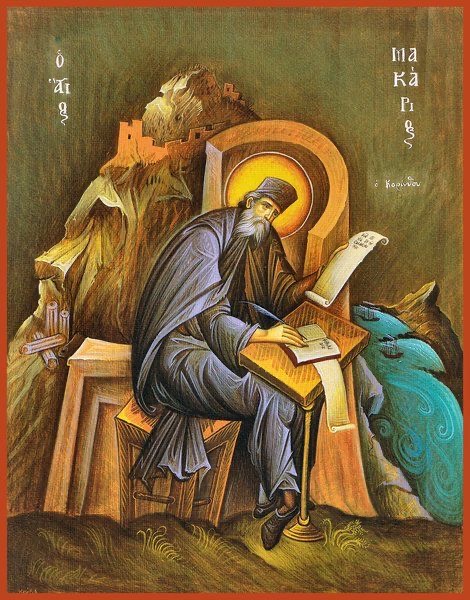
St. Makarios was born in Egypt around the year 300 AD, and reposed In the Lord in 391 AD. When he was a child, persecutions against Christians were still raging, but after 313 (with the freedom granted to Christians by St. Constantine the Great), he was able to openly declare his Christian faith as a young man. It was from his childhood that he began to distinguish himself from his peers, and demonstrated a desire for a solitary life. Already in the desert of Thebes in Egypt was the first great ascetic, St. Anthony the Great (251 AD-356 AD), who had gained a great reputation for his ascetic struggles and sanctity of life (which lead to him being called “Megas”- Great). St. Anthony’s life was narrated by his contemporary, St. Athanasius the Patriarch of Alexandria. At the same time, St. Pachomius (260-348AD) had organized the pioneering first Monastery in Thebes.
St. Makarios decided to also pursue the ascetic solitary life in the desert at the age of 30. He was distinguished for his spiritual struggles, love for all, divine discernment, charisma, and the gift of miraculous prayer. His reputation spread far and wide as a distinguished healer. He was ordained (after many requests by the local Bishop) Deacon and Priest, and remained in the wilderness for 60 years with unceasing prayer, strict fasting, vigilance and spiritual exercises. One of the features of the saint’s life was his discretion, in that he covered the faults of others and acted as if he did not see them or hear them. In the case of a slander against him, St. Makarios took on the responsibility of caring for the person whom he supposedly wronged. When the saint’s innocence was revealed, he forgave his accusers as if nothing had happened.
There are 50 homilies from St. Makarios that are preserved to this day, and they show that not only was he very familiar with the Bible from frequent study, but that he also understood the depth of meaning found there. Based upon passages from the Bible, the depth of God’s love is revealed for humanity, and the ways it can be used for eternal salvation. The sickness of the soul is examined, with all of its weaknesses and passions, and how to heal the soul, freeing it from oppression.
For our own benefit, let us hear some of St. Makarios’ teachings which lead us to freedom from the passions:
With those who say that it is impossible to attain perfection and be purified of the passions or to even be filled with a good Spirit, we can clearly see their lack of knowledge of the divine Scriptures, where the Lord says to “Be perfect, as your heavenly Father is perfect” (Matthew 5:48). Our Lord prayed to the Father: “I desire that they also whom You gave Me may be with Me where I am, that they may behold My glory which You have given Me” (John 17:24). For He also said that “Heaven and earth will pass away, but My words will by no means pass away” (Matthew 24:35). St. Paul speaks of the same thing: “That we may present every man perfect in Christ Jesus” (Colossians 1:28), and that “we all come to the unity of the faith and of knowledge of the Son of God, to a perfect man, to the measure of the stature of the fullness of Christ (Ephesians 4:13). When we aim for perfection, we achieve two very good things: First, by undertaking an intense and uninterrupted struggle, we can end with the hope of conquering the situation and reaching the summit. Secondly, we are not overcome by arrogance and are modest in our approach because we realize that we are small and have not yet reached perfection.
St. Makarios also spoke on distinguishing between the virtues and passions of the soul, on patience and discrimination. He says that those who want to be disciplined in the word of God and to bear good fruit are accompanied by the following signs: Silence, prayer, perseverance, and good sorrow arising from pious feeling. Combine those with the following works: vigilance, fasting, temperance, meekness, long-suffering, unceasing prayer, study of the Scriptures, faith, humility, goodwill, submissiveness, labor, lack of malice, love, kindness, order, and in general the Light of the Lord (John 8:12). For those who do not produce such life giving fruit, the signs are: rigidity, impurity, unusual appearance, carelessness, pride, and deafness. Their works include gluttony, rage, anger, cruelty, haughtiness, infidelity, forgetfulness, greed, disorder, profanity, belligerence, arrogance, shame, a lack of generosity and good humor, ill-mannered, and ecstasy with Satan.
For the benefit of our spiritual life, let us seek to study the edifying words of this blessed saint.





